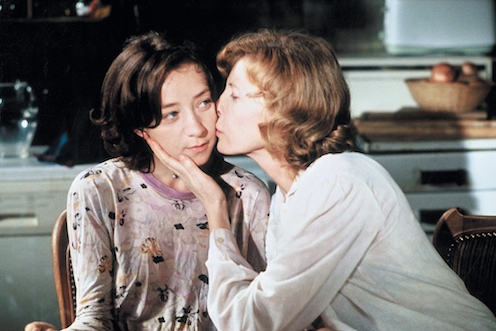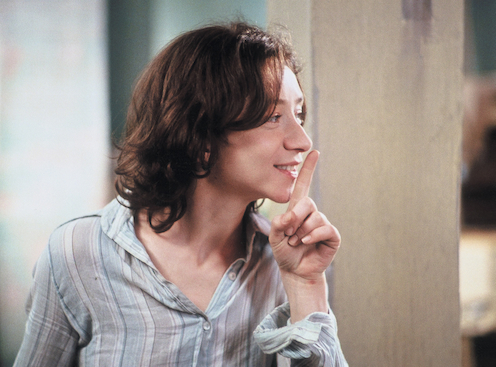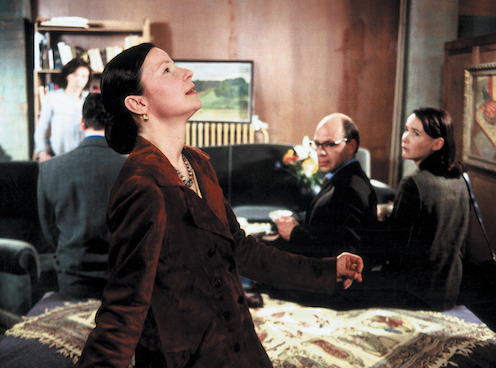Tomorrow We Move (Demain On Déménage)
Full Description
Imagine living with your mother. Chantal Akerman’s deliciously playful and thought-provoking Tomorrow We Move is the story of Charlotte (Sylvie Testud), a young, chain-smoking, erotic story writer, and her mother Catherine (Aurore Clément), a music teacher who moves in -- after the death of her husband -- grand piano in tow. The irrepressible, Belgian-born Akerman --whom film critic J. Hoberman once called "arguably the most important European director of her generation" -- has created a film that is audacious, musical, and filled with giddy slices of Parisian life. Escaping their cluttered apartment, Charlotte eavesdrops in cafes, gleaning banal and impassioned
phrases for her erotic novel, and ends up with more imaginary than real experience of Eros. Her mother insists on giving healthy doses of romantic advice to her daughter while arbitrarily moving furniture in and out of the
apartment. When they decide to relocate, a parade of prospective buyers traipses in and brings the process of showing one’s home to strangers to a hilarious level of absurdity. In several characters, Akerman has created surprising and unsentimental portraits of survivors of the war. She boldly deconstructs stereotypes of survivor quirkiness, while creating a drama in which her characters’ motivations are not always clear, but are always delightfully human. Testud and Clément are charming and give tour de force performances as daughter and mother in search of happiness, or at least love and a finely tuned piano.
Filmmaker Bio(s)
Born in Brussels, Belgium in 1950, Chantal Akerman is a filmmaker whose work gives new meaning to the term "independent film." An Akerman film is an exercise in pure independence, pure creativity, and pure art. The viewer must give him- or herself over completely to the experience of the film, to watch with open eyes and an open mind. To label Akerman's work "minimalist" or "structuralist" or "feminist" is to miss most of what she is about. Strong themes in her films include women at work and at home, women's relationships to men, women, and children, food, love, sex, romance, art, and storytelling. Each Akerman film is a world unto itself and demands to be explored on its own terms.
Legend has it that Akerman's passion for film was inflamed when, at the age of 15, she wandered into a Brussels movie theatre and saw Jean-Luc Godard's landmark film, PIERROT LE FOU. Soon after, she enrolled in the Belgian film school, INSAS, but quit after two years, finding herself understandably more interested in making films than in sitting in a classroom. Legend further has it that she saved money from clerical and waitressing jobs to make her first short film, SAUTE MA VILLE (1968), a Chaplinesque tragicomedy.
In 1972, Akerman moved to New York, where she became acquainted with avant-garde filmmakers, most notably Michael Snow. Her first two features, HOTEL MONTEREY (1972) and je tu il elle (1974), were followed by the masterful 200-minute JEANNE DIELMAN, 23 QUAI DU COMMERCE, 1080 BRUXELLES (1975), which stars the astonishing Delphine Seyrig as a Brussels widow who becomes unglued when the regimented life she leads with her son begins to unravel. In 1968, Akerman returned to New York and made NEWS FROM HOME, followed two years later by LES RENDEZ-VOUS D'ANNA, and in 1982, TOUTE UNE NUIT.
In 1983 Akerman completed LES ANNEES 80, a study for the wild and wacky Parisian shopping mall musical, WINDOW SHOPPING, which is a nice companion piece to -- if not the inspiration for -- Woody Allen's 1996 hit EVERYONE SAYS I LOVE YOU. In between her theatrical works, Akerman has made numerous projects for French television, among them a film on Pina Bausch and two films with classical pianist Alfred Brendel.
Akerman's films of the '90s include: NUIT ET JOUR (1991); D'EST (1993); PORTRAIT D'UNE JEUNE FILLE DE LA FIN DES ANNEES 60, A BRUXELLES (1993); and A COUCH IN NEW YORK (1996).
Director(s)
Country(ies)
Language(s)
w/English Subtitle
Release Year
Festival Year(s)
Running Time
112




